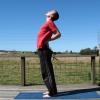Hello everyone!
I was wondering, since there are a number of experienced individuals on here, if I could get some advice.
Lately (for a couple years now) I've been experiencing extended periods of time that are just pure brain fog and mental fatigue. It may have to do with the fact that I'm a college student and I'm expected to use my mental facilities a lot. It may also relate to stress, as I find when I take supplements that promote calmness (like 5-HTP) I find it easier to speak my mind and let my emotions out, and things seem sort of clearer.
I've also tried many different nootropics to help alleviate the problem. Racetams largely don't work long term, especially piracetam (which makes me incredibly tired sometimes). Noopept and sunifiram have been somewhat helpful, but not quite enough usually. Vinpocetine makes things clearer but it makes me extremely irritable and angry.
I saw a counselor, who didn't see any reason to diagnose me with a disorder. I considered a deficiency in vitamins, and it's not that. I tried supplementing tyrosine in case I had ADHD, and it only helped mildly. I tried getting more sleep, which also helps but not completely. I have heard exercising CAN help, but I haven't had the energy or motivation to do that lately.
Does anyone have any idea or advice on what to do? Anything at all would help, and I appreciate all of your input



















































